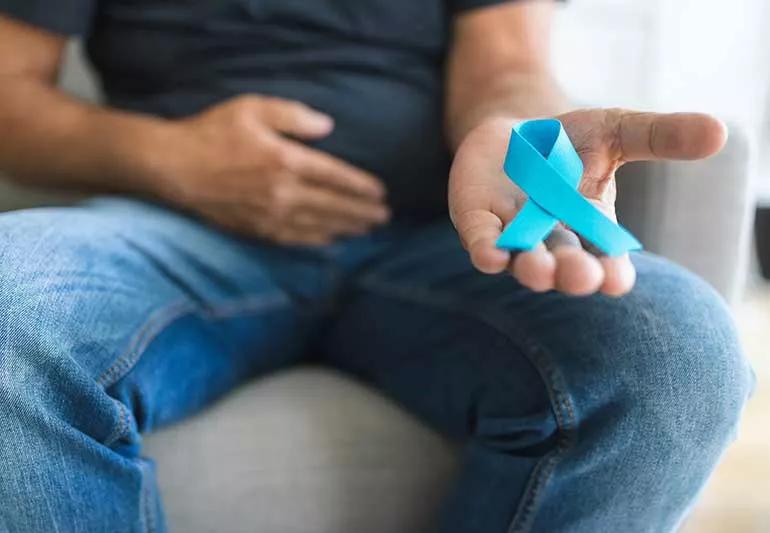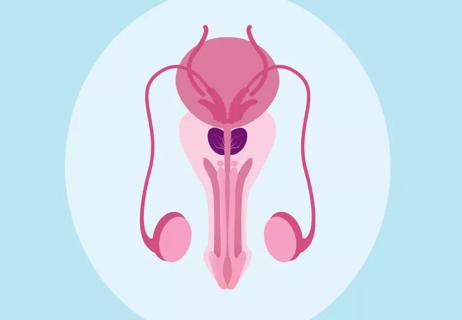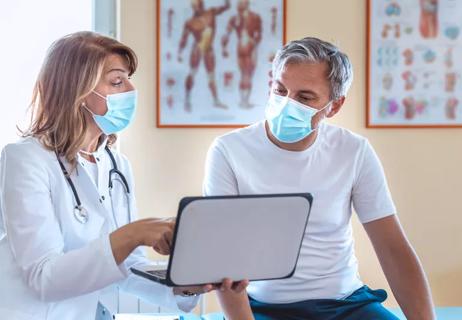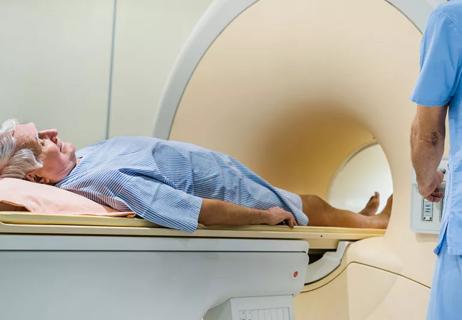Sex may be different after prostate cancer treatment, but it can still be enjoyable

If you have prostate cancer and your healthcare provider recommends treatment, you might be wondering how your sex life may or may not be affected. You’re not alone if you have questions about this, as this is a common concern.
Advertisement
Cleveland Clinic is a non-profit academic medical center. Advertising on our site helps support our mission. We do not endorse non-Cleveland Clinic products or services. Policy
“Treating prostate cancer is about treating the whole person,” says urologist Raevti Bole, MD. “We have many effective therapies to help you resume intercourse if that’s your goal. But we want you to feel like you can talk to your provider and partner about your issues or concerns.”
Dr. Bole explains how your sex life may evolve after treatment and answers some commonly asked questions.
Sexual and urinary side effects are common after prostate cancer treatment. “But yes, we can help most people get back to a satisfying sexual experience, though this may look different after treatment,” says Dr. Bole.
There are two gold-standard treatments for prostate cancer:
New treatment options, such as high-intensity focused ultrasound therapy and cryotherapy, are being investigated for the potential to treat focused areas of the prostate gland and potentially lessen sexual side effects. But these treatments are typically only an option for certain types of prostate cancer, and you may eventually need a prostatectomy or radiation therapy down the line. Consultation with a urologist who specializes in prostate cancer is the best way to determine if you’re a candidate for any type of focal therapy.
Advertisement
To confirm a diagnosis of prostate cancer, you need to have a biopsy. During this test, your healthcare provider collects a sample of prostate tissue to look for cancer. They can do this in one of two ways:
Though you may be sore for a couple of days, there aren’t any restrictions on sexual activity after having a biopsy. It’s common to notice old blood in your ejaculate for up to a month or two. This typically goes away on its own as you heal and isn’t associated with pain. Infection is a risk after a biopsy, though the risk is much lower when it’s taken through your perineum.
“For the vast majority of men undergoing an uncomplicated biopsy (either transrectal or transperineal), long-term sexual function should not be affected,” reassures Dr. Bole.
In most cases, if you’re feeling well, you should be able to ejaculate or have sex again when you feel ready. If you participate in receptive anal sex, you should wait for two weeks or until you’re fully healed, especially if you had a transrectal biopsy. But if you experience any blood, pain or swelling, you should refrain from sexual activity until you meet with your healthcare provider.
Once your provider confirms a diagnosis, they’ll discuss your treatment plan with you. Both prostatectomy and radiation therapy can affect your sexual performance in the following ways:
Your anus doesn’t create its own lubricant, so the tissue inside of your anus is delicate and susceptible to tearing. Luckily, that tissue heals relatively quickly. If you have anal sex, it’s important to let your surgeon know before you have your prostate removed. Your surgeon will help you determine when it’s safe to insert anything anally. In most cases, it’s OK to participate in anal sex after six weeks.
“Know your body and take your time,” advises Dr. Bole. “If you’ve waited to heal after prostate removal, but you have anal intercourse and notice pain or blood, talk to your surgeon who may advise you to wait longer.”
In some cases, having your prostate removed may affect your ability to enjoy receptive anal sex.
For some people, undergoing prostate cancer treatment can result in some difficulty getting or maintaining an erection. This erectile dysfunction (ED) occurs because the nerve bundles that help control erections sit behind your prostate.
Surgeons make every effort to leave these nerve bundles intact, but the nerves may become damaged. If the tumor has grown into your nerve bundles, your surgeon may remove the nerves entirely.
Advertisement
“Erectile dysfunction is not uncommon after prostate cancer surgery, but the level of effect is variable in the short and long term,” explains Dr. Bole. “Your prognosis depends on your erectile function before treatment, your age and whether your nerves were spared. Erectile function can improve for up to two years after surgery, but it’s possible that it does not return to normal. This is also affected by natural aging and any other health conditions you have.”
Radiation therapy can also affect the nerves around your prostate depending on the type of radiation, your age and health conditions. According to Dr. Bole, in general, five years after radiation therapy, about half of people have some level of erectile dysfunction.
You can orgasm after prostate cancer treatment, but it usually results in a dry orgasm. With a dry orgasm, no fluid comes out of your urethra when you climax. But you can still feel the pleasurable sensation of climax.
Why do you have a dry orgasm? If you had a prostatectomy, the procedure removes the seminal vesicles (which produce and hold your semen) and cuts the vas deferens, so there isn’t any semen to come out. And radiation therapy causes the tissues in and around your prostate, including your ejaculatory ducts, to become fibrous, or stiff and dense. Although there isn’t a reliable treatment to improve a dry orgasm, it’s a common condition where up to 90% of people who receive radiation therapy can develop dry orgasms over time.
Advertisement
Climacturia is when you leak any drops of urine during an orgasm. Though this number can vary, on average, climacturia can occur in about 25% of people after prostate removal. Studies have found that of these people, only half of them have enough climacturia to be bothersome.
Androgen deprivation therapy often accompanies radiation therapy and reduces testosterone production in your body. When you have low testosterone, you could experience a decrease in your sex drive (libido). “The general stress and anxiety of treatment may also affect your desire to have intercourse,” notes Dr. Bole.
If you’ve had your prostate removed, you can’t get someone pregnant through intercourse. After surgery, you no longer produce semen, which carries sperm when you ejaculate. Radiation therapy also reduces semen production and affects your ability to make sperm.
If you’re considering having children, talk to your healthcare provider before prostate cancer treatment. There are several options for preserving fertility before cancer treatment or retrieving sperm (if you have them) after treatment.
Sex is often different after prostate cancer treatment, but it can still be enjoyable. “Treatments for ED are often focused on penetrative intercourse,” says Dr. Bole. “But the sexual experience is often not just about penetration. We work with you to discuss your goals for sexual health or intimacy with a partner.”
Advertisement
Treatments for ED include:
There are many medications to treat ED, including Viagra® and Cialis®. “These medications are often the first treatment we recommend,” says Dr. Bole. “They are inexpensive, and if you don’t like them, or they don’t work well for you, you can stop taking them at any point.”
The goal of penile rehabilitation is to reduce the risk of permanent ED before you have treatment. It focuses on increasing oxygenation and preserving the structures of the erectile tissues to prevent long-term damage. The theory is that helping people regain erections earlier than later after treatment could prevent long-term damage. Think of it as a “use it or lose it” approach.
This is an active area of research and there’s no standard protocol that’s been proven best for every person, says Dr. Bole. Your oncology team may recommend their preferred protocol, such as oral medication, to promote the early return of erectile function and, hopefully, longer-term recovery.
Medication you inject into the base of your penis, called intracavernous injections, can improve your ability to stay erect. Your healthcare provider can teach you how to inject the medication for times when you want an erection.
“The medication takes about 10 or 15 minutes to take effect and may not be the best option if you have a fear of needles,” notes Dr. Bole. “But if you’re looking for a better erection after prostate treatment, and the oral medications are not working, injections can be very effective.”
A vacuum erectile device (also known as a penis pump) draws blood into your penis to help you get an erection. Usually, it comes with a rubber ring you slip down over the base of your penis to hold the blood in. It can be a good option if medications aren’t working well or you don’t want surgery.
There are several types of penile implants to improve erections, including:
If you have climacturia, pelvic floor muscle therapy can help you improve urinary control. This noninvasive treatment involves simple exercises to strengthen the muscles that help regulate urination.
Surgery is another option. Your healthcare provider can insert a sling made from synthetic mesh-like surgical tape around the area of your urethra to reposition it. The pressure caused by the sling often helps prevent leakage.
People with climacturia may also experience erectile dysfunction. “In the instance you experience both, we can do a combined surgery to put in a penile prosthesis and a sling to address both problems,” says Dr. Bole.
Sex therapy, couples therapy and support groups are important resources for people who’ve undergone prostate cancer treatment and their partners. Sex can often be an uncomfortable topic, especially if you or your partner are experiencing changes in sexual behavior and are unsure of how to communicate your feelings. If you’re experiencing shame or embarrassment, or feel like you’re inadequate, please know that these side effects of prostate cancer treatment are common and (in most cases) treatable with the right tools and therapies.
Some therapeutic options that can be beneficial after your treatment include:
“Our goal is to make sure you live the longest, healthiest and most fulfilling life possible,” says Dr. Bole. “We treat cancer to protect your life, then we help get back your quality of life. If intimacy and intercourse are important to you, we can help you get back to experiencing those again safely.”
Learn more about our editorial process.
Advertisement

Possible signs include slow urine flow and loss of bladder control — but if this common cancer is caught before it spreads, the prognosis is good

You don’t have to cope in silence with issues like urinary incontinence and sexual dysfunction

Family history and genetics may heighten your risk for prostate cancer

Check-in with your care team, and focus on low-impact exercises and walking for good gains

Yep! Research shows a possible connection

Not following recommended follow-ups could put you at risk

High-intensity focused ultrasound (HIFU) provides new treatment options

MRI improves detection, but it's not yet a substitute for standard biopsy

Wearing a scarf, adjusting your outdoor activities and following your asthma treatment plan can help limit breathing problems

Your diet in the weeks, days and hours ahead of your race can power you to the finish line

When someone guilt trips you, they’re using emotionally manipulative behavior to try to get you to act a certain way